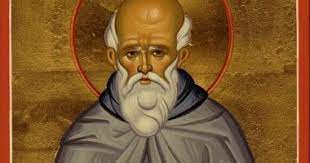St Maximus of Riez (-:460) was raised in a Christian home, in his youth he began to live as a hermit there. He became a Monk at the monastery founded by Saint Honoratius in Lerins, France. He later became an Abbot in 426; Saint Sidonius wrote about the revitalization of the monastic life under Maximus’ leadership.
He reluctantly became the bishop of Riez, Provence in 434, consecrated by Saint Hilary who had tracked him down at his hermitage. He Lived as much as a monk as his vocation as bishop would allow. Attended synods at Riez in 439, Orange in 441, and Arles in 454. One of the most influential bishops in the Gaul of his day.
In his early life, Maximus was a civil servant and an aide to the Byzantine Emperor Heraclius. He gave up this life in the political sphere to enter the monastic life. Maximus had studied diverse schools of philosophy, and certainly what was common for his time, the Platonic dialogues, the works of Aristotle, and numerous later Platonic commentators on Aristotle and Plato, like Plotinus, Porphyry, Iamblichus, and Proclus. When one of his friends began espousing the Christological position known as Monothelitism, Maximus was drawn into the controversy, in which he supported an interpretation of the Chalcedonian formula on the basis of which it was asserted that Jesus had both a human and a divine will. Maximus is venerated in both the Catholic and Eastern Orthodox Churches. He was eventually persecuted for his Christological positions; following a trial, his tongue and right hand were mutilated.
He was then exiled and died on 13 August 662, in Tsageri in present-day Georgia. However, his theology was upheld by the Third Council of Constantinople and he was venerated as a saint soon after his death.



